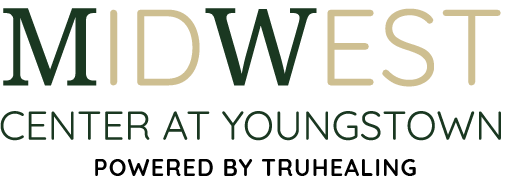The goal of any treatment program is not only to prevent a patient from drinking or taking drugs. To acquire the complete set of skills required for sober living, they must also have the opportunity to immerse themselves into the healing process, performing deep emotional and psychological work. At Midwest Center at Youngstown, we believe that residential programming in Youngstown offers the best chance of achieving long-term recovery. Contact our team at 844.544.0502 to learn more about our residential addiction treatment benefits today.
What Is a Residential Treatment Program?
A residential treatment program enables patients to enter an immersive healing protocol for a period of time where they also live on-premises. This model allows them to focus entirely on their own care while allowing a respite from some of the external stressors that may have contributed to the formation of their substance abuse problem.
Residential treatment is more successful in setting the stage for long-term sobriety, especially with patients who have historically struggled with outpatient therapies. They allow all of the primary resources required to remain directly at hand for the length of their treatment (generally between 1 and 6 months).
3 Benefits Of Residential Treatment In Addiction Recovery
1. More Structured Care
Patients who enter a residential treatment program will have an easier time coping with crucial transitions, such as moving from detox to individual and group therapy. For example, if unexpected withdrawal symptoms appear, requiring temporary maintenance medications, patients will continue to have access to the medical team that supervised their detox. These relationships can be particularly critical to patients with co-occurring disorders.
2. Allows Patients to Focus on the Healing Process
For many patients, it may be difficult, or even impossible, to focus on their own needs when surrounded by their family, loved ones, or anyone else they feel relies on their care. Living in residential treatment allows patients to focus on their own needs, especially those unmet needs that resulted in substance use.
Due to the lack of access, patients will be offered a window of time where temptations to use drugs and alcohol will be significantly reduced. This can be very helpful in allowing newly sober patients to surmount initial cravings.
Other advantages of this approach include:
- The temporary removal of negative influences and people, allowing patients a clear picture of what and who might serve as potential triggers when they return
- The opportunity to establish a regular routine, which can be highly beneficial in creating new habits
- Offering a safe environment, free from the stressors of daily life
- Most programs offer 24/7 access to medical care, therapists, and other trained support staff, allowing patients greater peace of mind if they encounter difficulties or unexpected symptoms.
3. Community Support
Individuals combating substance abuse often feel isolated in their struggle. This is understandable, as succumbing to substance abuse can bear a negative stigma among many communities. Even close friends or loved ones who have not experienced a dependency on drugs or alcohol may not fully understand what they are going through.
In a residential treatment program, however, patients can enter an empathetic community that truly understands their difficulties living in a sober environment. They are likely to be surrounded by patients in various stages of healing, offering tangible evidence that they can move past their dependence. In fact, these connections often lead to lasting bonds, permitting patients a support network they can turn to when moving on to an aftercare program.
Reach Out for Residential Treatment at Midwest Center at Youngstown
A successful treatment program will set the stage for a life in recovery. At Midwest Center at Youngstown, we can help you acquire the necessary skills to not only live in permanent sobriety but thrive. Help is always available. Contact our team at 844.544.0502 to learn more about how residential treatment can help you regain control over your life.

